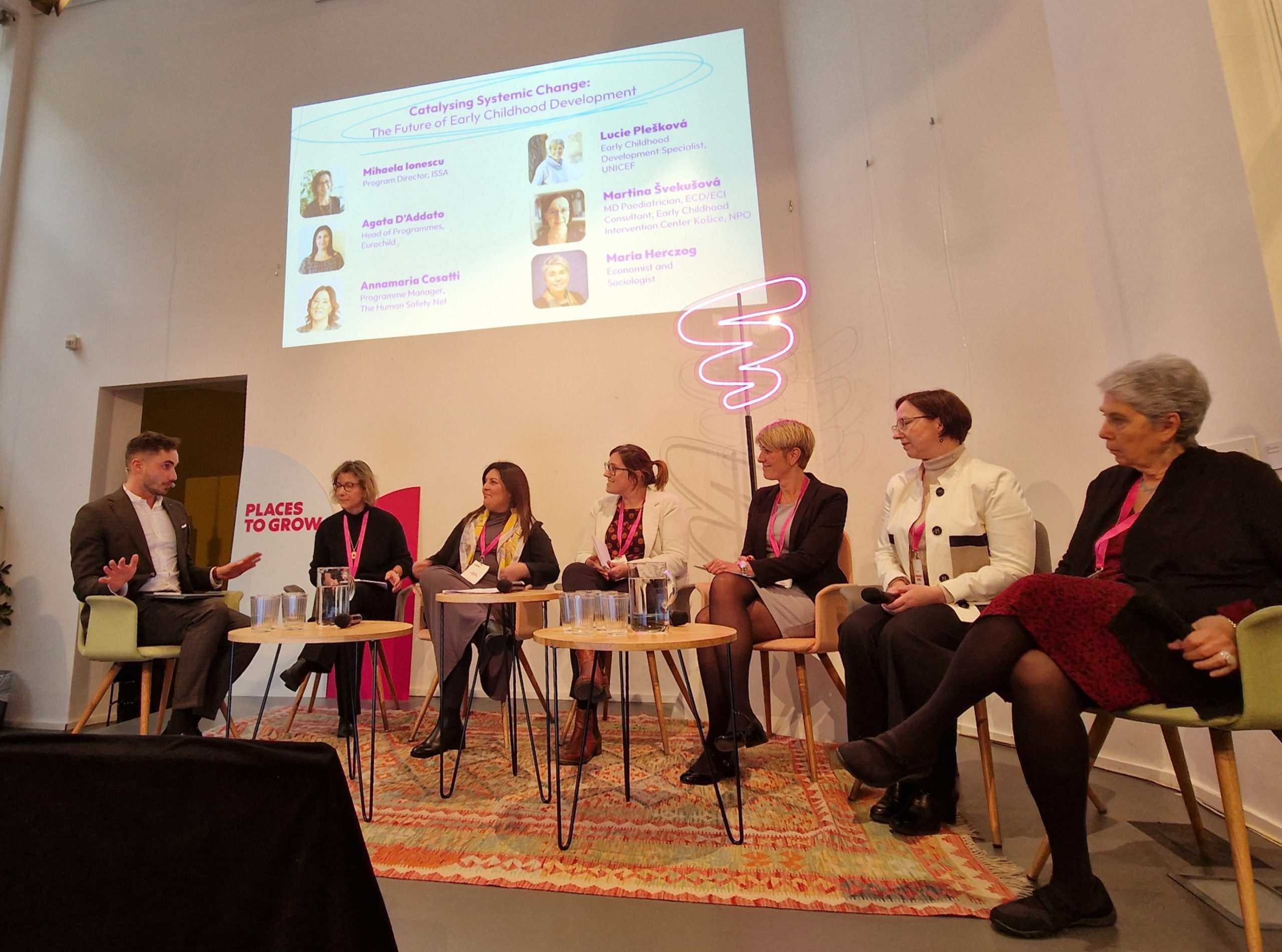Eurochild joins the Places to Grow conference in Prague
A blog from Agata D’Addato, Eurochild Head of Programmes, on her participation as panelist in the Places to Grow conference, in Prague, to discuss effective strategies for supporting ECD together with leaders and advocates of early childhood development (ECD).
I participated at the conference as panelist, together with other distinguished leaders in the field. The first question I was asked was a very interesting one: “If every policy leader in the world woke up tomorrow with one new belief about ECD that you implanted, what would that belief be?”.
The voices of the youngest age groups of children are often left out of decision-making and simply not heard. But part of that is because of adults’ inability to figure out how to ask for their perspectives, for example in discussions around early childhood curricula and child rights.
Therefore, the new belief from my perspective would be the recognition of children from their earliest years as equal partners and their right to participate in public policy. We still face enormous barriers from adults who have the misconception that due to the evolving maturity of children they cannot participate in decision-making and in shaping the decisions that impact on them. With the right tools and support, even very young children can engage in participation processes and have their voices heard. But this requires adults to have the necessary skills and tools at hand.
It is really important that all professionals who work directly with children receive the necessary training to encourage and facilitate children’s participation, with age-appropriate, child-centred, and creative methodologies for very young children.
We also talked about policy changes that are most essential to build integrated ECD system.
In many countries, public policies remain deeply inadequate to provide all children with opportunities to fully develop and thrive. ECD presents a particular challenge to policymakers due to its multi-sectoral nature and the necessity to reach a variety of stakeholders to influence outcomes. That includes parents and caregivers, a range of service providers, and young children themselves.
Establishing an enabling environment is foundational for effective ECD policies, providing the mechanisms and means to design and implement ECD policy, deliver services, and monitor outcomes.
In the context of ECD, establishing an enabling environment entails:
1. An adequate legal and regulatory framework to support ECD provision.
Of course, the existence of laws and policies alone does not guarantee desired ECD outcomes. In many countries, policies on paper and the reality of access and service delivery on the ground are not aligned. While many governments have strong legal frameworks and key policies, outcomes for young children are lagging. While not a sufficient condition for a strong ECD system, a sound legal framework is usually a necessary condition for one.
2. Coordination within and across sectors and institutions is necessary to ensure effective service delivery. Children’s development will not be adequately addressed by interventions through any single sector alone.
3. The availability of adequate resources and systems to allocate financing will determine the extent to which the enabling environment supports the ECD system. In general, financing mechanisms for early childhood policies are inadequate. Countries are not using explicit criteria to determine ECD spending, and the majority of governments cannot accurately report ECD expenditures across all relevant sectors. Remuneration for the ECD workforce remains inadequate in many countries. This has important implications for efforts to improve the quality of services provided to young children and for efforts to scale. We have to say, however, that increased funding along, while needed, will not create systems change. The transition is a political and ethical project, which will make the systems more inclusive, sustainable, resilient and responsive to changing needs.
Moving forward
Implementation of interventions to optimise child development need guidance and political will to promote coordinated governance, increased funding and capacity, and also, I would add, improved data collection to inform whether programmes work or do not work. How do we bring more accountability into the system? How do we ensure that the communities, families and children that are involved in or are beneficiaries of these services are actively engaged helping to evaluate and improve those services?
Mindset change is a political task that requires a vision for society to be created and material conditions that offer incentives for change. That is why it is so important to keep advocating for a stronger commitment from European and national policymakers so that comprehensive and integrated strategies for early childhood are not just designed and adopted, but also implemented on the ground providing the opportunity for all children to thrive.
We need to engage with policymakers and make our work count, let’s join forces and build alliances, let’s use the arguments that use hard evidence, but couple it with “pathos” and language that appeals emotionally and the imagination.
If it’s good for the children, it’s also good for everybody else!





